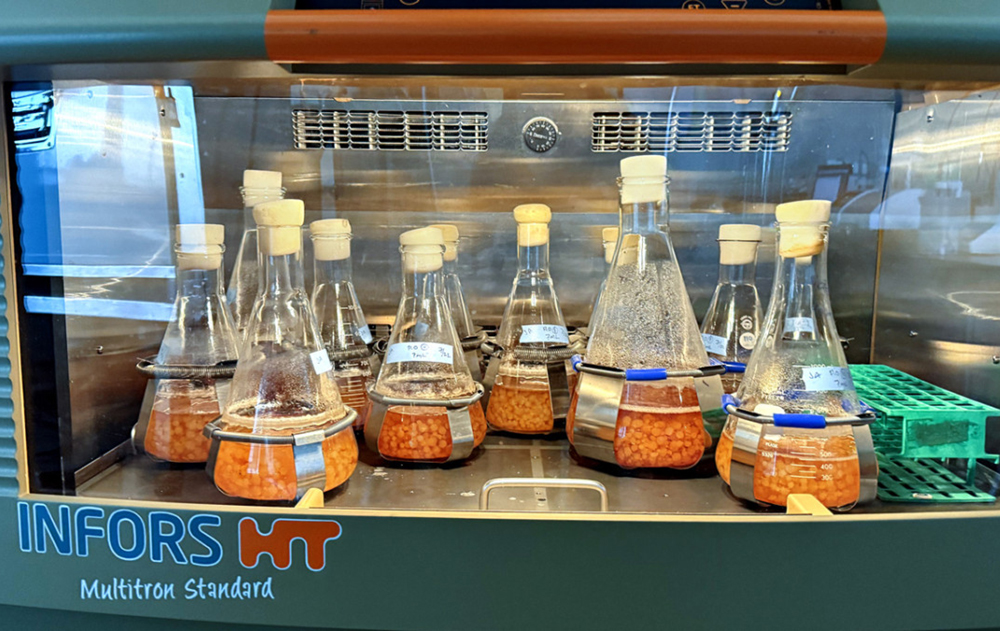

IBioIC unveils £850,000 fermenter to supercharge Scotland’s bioeconomy
Scotland’s industrial biotechnology sector has taken a major step forward with the launch of a 300-liter open-access fermenter, a significant boost for early-stage companies developing sustainable, bio-based products.
The new fermenter, located at the Industrial Biotechnology Innovation Centre’s (IBioIC) FlexBIO facility at Heriot-Watt University in Edinburgh, was made possible through an £847,000 (US$1.08 million) grant from Scottish Enterprise. It is the first of its kind in Scotland to be accessible to businesses and researchers alike, providing a bridge between lab-scale innovation and industrial production.
At a launch event held across FlexBIO and the National Robotarium, industry stakeholders gathered to mark the occasion, hear from project leaders, and view the newly installed equipment. Among those in attendance were Sheena Fraser, Dr Mark Bustard, Professor Richard Williams, and Adrian Gillespie, who officially cut the ribbon on the fermenter.
The new equipment increases IBioIC’s upstream bioprocessing capacity tenfold, moving from 30 liters to 300 liters. Fermenters are a type of bioreactor used to grow microorganisms such as yeast, bacteria, and algae – key ingredients in producing everything from cultivated meats and plant-based proteins to sustainable textiles and bio-based pharmaceuticals.
According to Mark Bustard, CEO of IBioIC, the fermenter fills a crucial infrastructure gap for companies trying to transition from research to commercial viability. “The new fermenter will provide a significant boost for Scotland’s bioeconomy, offering the vital scaleup infrastructure that many companies need to take the next step,” he said. “It enables a smoother transition from lab research to industrial production, giving businesses greater confidence and credibility as they seek investment to scale. Beyond that, it also reinforces Scotland’s reputation as a hub for sustainable innovation and a leading destination for producing bio-based products and materials.”
One of the persistent challenges in the biotechnology sector is known as the 'valley of death' – the difficult and costly leap between laboratory breakthroughs and market-ready production. Many early-stage firms struggle with limited access to both large-scale equipment and technical expertise. FlexBIO is designed to tackle both barriers, offering businesses not just state-of-the-art tools but also expert support under one roof.
Fermentation plays a pivotal role in industrial biotechnology. It allows companies to replace petrochemical-based manufacturing processes with biological alternatives, offering a more sustainable path across industries. The fermenter’s applications extend to sectors as diverse as food production, cosmetics, fashion, and medicine.
Adrian Gillespie, CEO of Scottish Enterprise, emphasized the importance of this investment in strengthening Scotland’s innovation pipeline. “Providing access to cutting-edge equipment, like this fermenter, is a vital step in supporting Scotland’s bio-based manufacturers to reach their full potential,” Gillespie said. “Using these facilities will help ambitious spinouts, start-ups and smaller companies to scale up, accelerating their journey from the lab to full-scale production. At Scottish Enterprise, we’re focused on helping more companies to scale, creating more high quality jobs and economic growth for Scotland.”
This move forms part of the Scottish Government’s broader strategy to position the country as a global leader in sustainable industry, with industrial biotechnology playing a central role in efforts to achieve net-zero emissions by 2045. The fermenter is expected to play a critical part in enabling the next generation of bio-based companies to contribute to that goal.
If you have any questions or would like to get in touch with us, please email info@futureofproteinproduction.com

.png)






